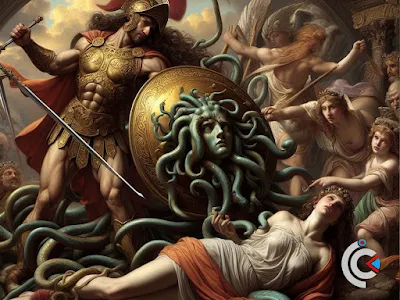Medusa's most distinctive feature is her head full of snakes instead of hair, a curse placed upon her by the goddess Athena. According to the myth, Medusa was once a beautiful maiden, but she incurred the wrath of Athena by desecrating her temple, or in some versions, by lying with Poseidon in Athena's temple. As punishment, Athena transformed her hair into snakes and made her face so terrible that anyone who looked directly at her would turn to stone.
Medusa's myth is most famously associated with the hero Perseus. He was tasked with retrieving her head as a gift for King Polydectes. With the help of Athena and other gods, Perseus managed to slay Medusa by using a mirrored shield to avoid her gaze and decapitating her while she slept. From her severed neck sprang forth the winged horse Pegasus and the giant Chrysaor.
The head of Medusa became a potent symbol in ancient times, believed to ward off evil and protect against danger. It was often depicted on shields and in architecture as a form of apotropaic magic.
Medusa's story has been retold and reinterpreted in various forms of literature, art, and popular culture, often serving as a symbol of female power, rage, and the dangers of unchecked desire.
Medusa: Echoes of Sorrow - Unveiling the Humanity Behind the Myth"
An alternative idea about Medusa could be to reinterpret her as a misunderstood figure rather than a villainous monster. In this interpretation, Medusa could be portrayed as a victim of circumstance, her transformation into a Gorgon and her curse seen as unjust punishments inflicted upon her by the gods.
In this version of the myth, Medusa could have been a wise and powerful priestess or healer, revered by her community for her knowledge and abilities. However, her beauty and
wisdom might have attracted jealousy and resentment from others, leading to her downfall. Perhaps she was falsely accused of a crime she did not commit, or her actions were misinterpreted by the gods.The curse that turned her hair into snakes and made her gaze petrifying could have been a result of a tragic misunderstanding or a cruel act of vengeance by a deity. Instead of being a malevolent force, Medusa could be portrayed as a tragic figure, struggling to come to terms with her monstrous appearance and the isolation it brings.
In this alternative narrative, Medusa's encounter with Perseus could be depicted as a complex and morally ambiguous confrontation. Rather than a heroic slaying of a monster, it could be portrayed as a clash between two individuals caught in the machinations of fate and divine intervention. Perseus may come to understand Medusa's plight and ultimately show her compassion, leading to a different resolution than her death.
This alternative interpretation of Medusa's story could explore themes of prejudice, redemption, and the complexity of morality, offering a fresh perspective on a classic mythological figure.
#Greek #mythology #Medusa #Gorgon #Perseus #mythological #creatures #ancient #Greece #heroism #divine #wrath #myths#legends #reinterpretation #reinterpretation #alternative #misunderstood #character #empathy #mythological #storytelling




.jpeg)

.jpeg)

No comments:
Post a Comment